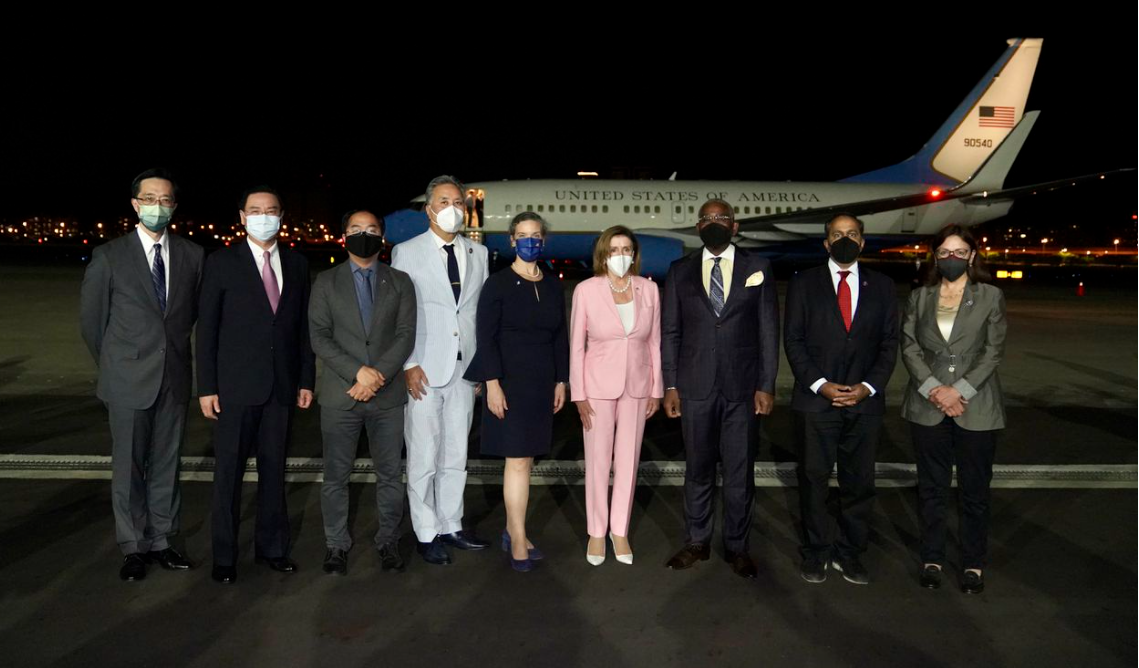Mon Aug 08, 2022
Monday / August 8
China retaliates Pelosi visit
China announced on Friday it was halting dialogue with the United States in a number of areas, including between theater-level military commanders and on climate change, over U.S. House Speaker Nancy Pelosi's visit to Taiwan.
China's foreign ministry said it was also suspending exchanges with Washington on countering cross-border crime and drug trafficking. Washington called the moves "irresponsible."
China launched military drills in the seas and skies around Taiwan on Thursday. The live-fire drills, the largest ever conducted by China in the Taiwan Strait, are scheduled to continue until noon on Sunday.
Taiwan's defence ministry said on Friday it flew jets to warn away Chinese aircraft that it said entered the island's air defence zone. A total of 68 Chinese military aircraft and 13 navy ships, some of which crossed the median line, had conducted missions in the strait, the ministry said.
China's Eastern Theater Command of the People's Liberation Army (PLA) said in a statement it conducted air and sea drills to the north, southwest and east of Taiwan on Friday "to test the troops' joint combat capabilities."
US jobs
Hiring in July was far better than expected, defying multiple other signs that the economic recovery is losing steam, the Bureau of Labor Statistics reported Friday.
Nonfarm payrolls rose 528,000 for the month and the unemployment rate was 3.5%, easily topping the Dow Jones estimates of 258,000 and 3.6%, respectively. The unemployment rate is now back to its pre-pandemic level and tied for the lowest since 1969, though the rate for Blacks rose 0.2 percentage point to 6%.
Wage growth also surged higher, as average hourly earnings jumped 0.5% for the month and 5.2% from the same time a year ago. Those numbers add fuel to an inflation picture that already has consumer prices rising at their fastest rate since the early 1980s. The Dow Jones estimate was for a 0.3% monthly gain and 4.9% annual increase.
More broadly, though, the report showed the labor market remains strong despite other signs of economic weakness.
Kremlin takes financial measures
Russia has banned investors from unfriendly countries from selling shares in key energy projects and banks until the end of the year.
Western countries and allies, including Japan, have piled financial restrictions on Russia since it sent troops into Ukraine in late February. Moscow retaliated with obstacles for Western businesses and their allies leaving Russia, and in some cases seized their assets.
The decree by President Vladimir Putin and published on Friday, immediately bans investors from countries which supported sanctions on Russia from selling their assets in production sharing agreements (PSA), banks, strategic entities, companies producing energy equipment, as well as in other projects, from oil and gas production to coal and nickel.
Fresh US help to Ukraine
The Biden administration's next security assistance package for Ukraine is expected to be $1 billion, one of the largest so far, and include munitions for long-range weapons and armored medical transport vehicles, sources briefed on the matter told Reuters on Friday.
The package is expected to be announced as early as Monday and would add to about $8.8 billion in aid the United States has given Ukraine since Russia's invasion on Feb. 24.
If signed in its current form, it would be valued at $1 billion and include munitions for HIMARS, NASAMS surface-to-air missile system ammunition and as many as 50 M113 armored medical transports.
Last Monday, the Pentagon announced a separate security assistance package for Ukraine valued at up to $550 million, including additional ammunition for High Mobility Artillery Rocket Systems (HIMARS).
Wall Street
Stocks wavered Friday in a volatile trading session after the July jobs report was much better than expected.
The Dow Jones Industrial Average gained 76.65 points, or 0.23%, to end at 32,803.47. Even with Friday’s gains, however, it fell on the week.
The S&P 500 shed 0.16% to end at 4,145.19, and the Nasdaq Composite lost 0.50% Friday, falling to 12,657.56. Still, both the S&P 500 and the Nasdaq ended the first week of August higher.
Losses were offset by bank stocks. Energy stocks gained, but technology companies slumped.
